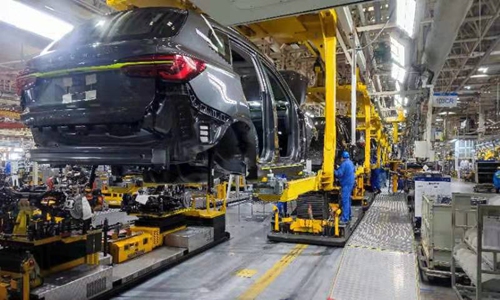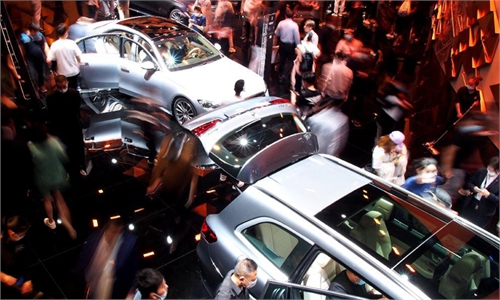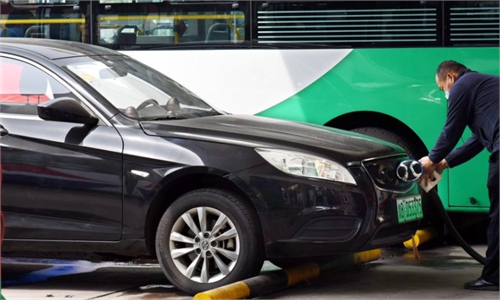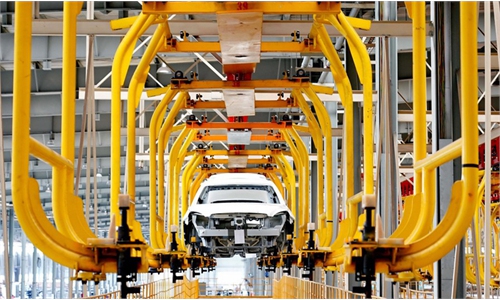China's auto industry makes a full comeback from COVID-19 with output returning to normal
Car output reaches normal levels; industry-wide work resumption speeds up

Employees from SAIC Motor work on the production line at Lingang base in Shanghai. Photo: Courtesy of SAIC Motor
China's car industry is making a full comeback from recent COVID-19 disruptions, with output at some major automakers returning to the normal levels and work resumption at auto parts makers, chip manufacturers and others accelerating, after recent epidemic flare-ups in major Chinese cities were tamed.
According to a statement sent to the Global Times by SAIC Motor, one of the largest Chinese automakers based in Shanghai, on Sunday, all of its three major plants in Shanghai have returned to pre-epidemic production levels.
SAIC said that the combined daily output of SAIC Motor Passenger Vehicle Co, SAIC Volkswagen Automotive Corp and SAIC General Motors Corp has reached 13,000 units, basically returning to the normal level before the recent COVID-19 outbreak in the city.
From June 1 to Saturday, SAIC produced more than 200,000 vehicles, an increase of more than 30 percent year-on-year, a sign that the automotive industry in the Yangtze River Delta is gradually returning to normal.
"We adopted the method of having engine plants take the lead in resuming work and prompted relevant suppliers to resume work, level by level. This can quickly and efficiently address any weakness in the industry chain," Chen Peifeng, director of SAIC Motor Passenger Vehicle Co's Lingang base, said in the statement sent to the Global Times on Sunday.
SAIC's decision is efficient and worth promoting, Zhang Xiang, a research fellow at the Research Center of Automobile Industry Innovation of the North China University of Technology, told the Global Times on Sunday.
"Work resumption and orders from the main engine plants will help suppliers detect and resolve weaknesses and problems in their supply chains and drive the work resumption of the whole industry," Zhang said.
He said that the "whitelist system" deployed by Shanghai authorities to arrange work resumption at core businesses and enterprises' experiences in closed-loop management in Shanghai can help them cope with any further epidemic shocks.
SKF, which makes and supplies bearings to major car companies, told the Global Times on Sunday that its output in Shanghai is back to 90 percent of the normal level.
SKF's production base and R&D center in Jiading district, as well as its distribution center in Waigaoqiao, kept operating after the outbreak began in March and the company was put on the second batch of the city's whitelist for work resumption in April.
The chip industry is also resuming work. A Shanghai-based automotive chip designer said his company is back to work as usual and rushing to finish delayed projects.
"As downstream demand grows, working overtime is the norm," he said, and logistics systems are also improving.
China's automobile sector has been restored to normal, with both output and sales in May increasing more than 50 percent from April, the Ministry of Industry and Information Technology (MIIT) said on Friday.
The rapid recovery had been expected, as both the central and local governments attached great importance to the work resumption with the "whitelist system" and other efforts to remove barriers in the industrial chain, as well as stimulus policies for the demand end, Zhang said.
According to the MIIT, since the ministry launched a coordination platform to unclog the logistics system for the automobile industry in April, it has solved more than 6,000 questions in logistics, transport and the resumption of work amid the automobile industry's self-help efforts.
"The automobile industry chain in the Yangtze River Delta has been running smoothly, which makes us more assured of formally resuming daily production," Chen from SAIC said.
On the demand end, many cities have eased restrictions on vehicle purchases and offered subsidies to boost consumption.
According to an optimistic forecast, China's auto sales may grow 2-3 percent from a year earlier, with strong growth for new-energy vehicles, Zhang said.
From January to May, total sales of new-energy vehicles hit more than 2 million units, up 111.2 percent from a year earlier, data from the China Association of Automobile Manufacturers on June 10.
"After China's vehicle production capacity returns to normal, sales of new-energy vehicles are expected to exceed 5 million units this year," Zhang said.



